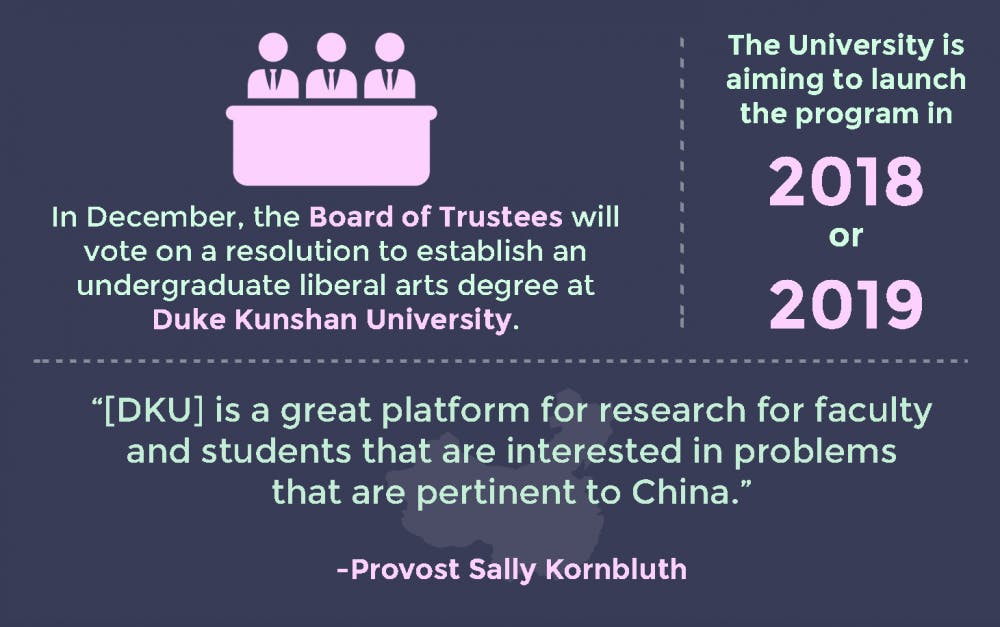Creating a liberal arts college in the middle of China is no easy task—and there are still many steps to go before Duke Kunshan University can open its doors to undergraduates.
At the December meeting of the Board of Trustees, members will vote on a resolution to establish an undergraduate liberal arts degree at Duke Kunshan University—the final step in a years-long approval process. Last week, the Academic Council voted to endorse the creation of the undergraduate degree by a vote of 57 to 18.
However, if the Board approves the resolution, there is still much work to be done before students can enroll in the undergraduate program.
“Universities do not appear by magic, and certainly not a university that Duke would want to have its name attached to,” said Michael Schoenfeld, vice president of public affairs and government relations.
Provost Sally Kornbluth said that the University is aiming to launch the program in 2018 or 2019. First, Duke must hire faculty and develop a plan for student recruiting, she explained.
Kornbluth noted that she hopes to see about 175 students in the first class, with the program growing to hold 500 students per class over time.
“We have had a few years of operation with the master’s programs, so we are not starting from a blank slate, but there is a lot of work to be done to launch a full undergraduate degree program,” she said.
In Kunshan, a task force will address issues including student recruitment, financial aid, faculty hirings and the student experience, said Denis Simon, executive vice chancellor of DKU. He noted that approximately 60 percent of the faculty will be DKU employees and around 25 percent may be Duke-affiliated.
Kornbluth said that DKU will be a place for faculty members to try out new forms of teaching that they can then bring back to Duke in Durham.
“It is a great platform for research for faculty and students that are interested in problems that are pertinent to China,” she said.
Nan Jokerst, J.A. Jones distinguished professor of computer and electrical engineering and chair of the Academic Council, noted the value of faculty-administrator cooperation going forward.
“When there is this kind of transparency and this level of discussion with feedback and revision of proposals based on this feedback, this makes the end product extremely strong,” she said. “You have the administration and the faculty saying together in partnership, to the world, that we all agree.”
One key component of the proposal is the curriculum that the degree will be based on. This has been the topic of extensive committee work and debate by faculty members since the winter of 2012.
“This was the most involved process at Duke that I’ve been a part of,” said Noah Pickus, associate provost and senior advisor to the provost. “We took our curriculum through 10 committees and went back to them several times. We consulted in China. That process of deliberation, and the incredible faculty that worked on the curriculum, really made it much better.”
The curriculum that resulted from this process divides subjects into divisional areas of knowledge—social sciences, natural sciences and arts and humanities—rather than traditional departments.
Thomas Robisheaux, professor of history and former chair of the Arts and Sciences Council, noted that in addition to maintaining the basic components of a Western liberal arts education, the curriculum captures key aspects of a Duke education such as experiential learning and interdisciplinary work.
“I think the curriculum embodies the finest we have to offer at Duke, but it is not like the Duke undergraduate curriculum that we have here,” he said.
On campus in Kunshan, Simon noted that graduate students and faculty are ready to welcome undergraduates and said they were all “excited to have a lot more people and things going on.”
The proposal, which President Brodhead called “aspirational” at the November meeting of the Academic Council, lacks only a positive vote by the Board of Trustees for implementation.
“Now all we have to do is make it work,” Pickus said.
Get The Chronicle straight to your inbox
Signup for our weekly newsletter. Cancel at any time.
Bre is a senior political science major from South Carolina, and she is the current video editor, special projects editor and recruitment chair for The Chronicle. She is also an associate photography editor and an investigations editor. Previously, she was the editor-in-chief and local and national news department head.
Twitter: @brebradham
Email: breanna.bradham@duke.edu

